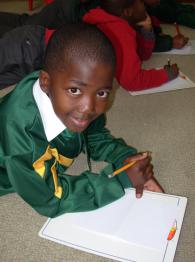
About the Project
This project is one of the 2010 WISE Awards finalists.
South Africa is in a socio-economic crisis. The national education system is in disarray, the population is poorly educated, there is a national skills’ shortage and often violent socio-political unrest is the norm. In a small but significant way, The Shine Centre is making a real contribution to securing the country’s future. The most important investment we can make is an investment in a sound education for the children of South Africa. Shine bestows the gift of literacy upon young readers from disadvantaged backgrounds, thereby establishing a strong basis for their continuing education, and sets them firmly on the path to lifelong learning. Its unique and innovative approach to literacy program development and delivery is increasingly attracting national and international recognition for the impact it is having in the early childhood development arena. Shine is dedicated to, and singularly focused on, the development and delivery of literacy support programs and interventions for school-going children in Grades 2 and 3 using trained volunteers and evidence-based methodologies and resources. Impact is measured by the increasing number of children who graduate from the program, the project’s ever-expanding organizational reach and footprint, and the cost-effectiveness of its model, as indicated by the Rand-value stretch.
Context and Issue
South Africa currently spends five percent of GDP on education. While this is in line with the spending levels of developed nations like the USA, the UK, Holland and Austria, recent studies have shown that, despite investment, South African schools perform well below expectations (NEEDU National Report, 2012). A myriad of factors contribute, including large class sizes, inadequate/poor access to learning resources, language barriers (learning in a second language), and sub-standard teaching. Shine provides highly effective child-based literacy interventions in a country where currently less than half of all Grade 3s can read at an acceptable level. Early intervention is therefore critical.
Children who struggle at a young age find it hard to learn across all subject areas and are therefore at risk of falling behind in their education, causing them to struggle to graduate from school, choose to drop out, or have difficulty finding meaningful employment. All these factors limit them from becoming economically active, contributing and purposeful citizens.
The Solution and Impact
The central idea of the project is that literacy levels can be improved dramatically by introducing individual support for learners who are at risk of not reading. A structured program, implemented by trained volunteers, ensures that learners struggling to read are provided with individual assistance, attention and encouragement, which are necessary for learning and success. Training is simple and accessible, and anyone who loves children, books and reading can volunteer. Each volunteer is placed with one or two children twice a week for an hour to help them develop their love of books and reading. Individual attention is a critical component in schools where class sizes are large and teachers typically overwhelmed.
In terms of the overall impact of the project, it was found through an internal study that as few as 36 hours of Shine intervention can take a child from being at an at-risk reading level to a satisfactory or good reading level. The project is simple, cost-effective and far-reaching. Skills learnt by those who attend training sessions and workshops impact broader communities.
Future Developments
The aim of the project for the next few years is to expand its reach and plan a ramped-up and diverse training program which will enable a wide range of citizens to start literacy programs of their own, supported by the Shine Centre. It is planned to facilitate the establishment of more Shine “Chapters” (social franchises) and Reading Clubs through the training program called “Shine in a Box”. A larger, more diverse and skilled training team will be established to tackle the increasing and varied requests for training and information sharing that are received.


